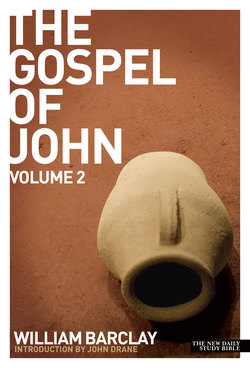Читать книгу New Daily Study Bible: The Gospel of John vol. 2 - William Barclay - Страница 21
На сайте Литреса книга снята с продажи.
ОглавлениеFREEDOM AND SLAVERY
John 8:33–6
They answered him: ‘We are the descendants of Abraham and we have never been slaves to any man. How do you say: “You will become free”?’ Jesus answered them: ‘This is the truth I tell you – everyone who commits sin is the slave of sin. The slave is not a permanent resident in the house; the son is a permanent resident. If the son shall make you free you will be really free.’
JESUS’ talk of freedom annoyed the Jews. They claimed that they had never been slaves to anyone. Obviously there was a sense in which this was simply not true. They had been captives in exile in Babylon; and at the moment they were subjects of the Romans. But the Jews set a tremendous value on freedom, which they held to be the birthright of every Jew. In the law, it was laid down that no Jew, however poor, must descend to the level of being a slave. ‘If any who are dependent on you become so impoverished that they sell themselves to you, you shall not make them serve as slaves: . . . For they are my servants, whom I brought out of the land of Egypt; they shall not be sold as slaves are sold’ (Leviticus 25:39, 42). Again and again, Jewish rebellions flared up because some fiery leader arose who insisted that the Jews could obey no earthly ruler because God was their only King.
Josephus writes of the followers of Judas of Galilee who led a famous revolt against the Romans: ‘They have an inviolable attachment to liberty, and they say that God is to be their only Ruler and Lord’ (Josephus, Antiquities of the Jews, 18:1, 6). When the Jews said that they had been no one’s slaves, they were saying something which was a fundamental article of their creed of life. And even if it was true that there had been times when they were subject to other nations, even if it was true that at that very moment they were subject to Rome, it was also true that even in servitude they maintained an independence of spirit which meant that they might be slaves in body but never in soul. In the fourth century, Cyril of Jerusalem wrote of Joseph: ‘Joseph was sold to be a bond slave, yet he was free, all radiant in the nobility of his soul.’ Even to suggest to the Jews that they might be regarded as slaves was a deadly insult.
But it was another slavery of which Jesus was speaking. ‘Everyone’, he said, ‘who commits sin is the slave of sin.’ Jesus was reiterating a principle which the wise Greeks had stated again and again. The Stoics said: ‘Only the wise man is free; the foolish man is a slave.’ Socrates had demanded: ‘How can you call a man free when his pleasures rule over him?’ Paul was later to thank God that the Christian was freed from slavery to sin (Romans 6:17–20).
There is something very interesting and very suggestive here. Sometimes when we are rebuked for doing something wrong or warned against such a thing, our answer is: ‘Surely I can do what I like with my own life.’ But the point is that those who sin are not doing what they like; they are doing what sin likes. It is possible to let a habit get such a grip of us that we cannot break it. We can allow a pleasure to take hold of us so completely that we cannot do without it. We can let some self-indulgence so dominate our lives that we are powerless to break away from it. We can get into such a state that in the end, as Seneca said, we hate and love our sins at one and the same time. So far from doing what they like, sinners have lost the power to do what they like. They are slaves to the habits, the self-indulgences, the wrong pleasures which have taken hold of them. This is precisely Jesus’ point. No one who sins can ever be said to be free.
Then Jesus makes a veiled threat, but one which the listening Jews would well understand. The word slave reminds him that in any household there is a difference between the slave and the son. The son is a permanent dweller in the household, but the slave can be ejected at any time. In effect, Jesus is saying to the Jews: ‘You think that you are sons in God’s house and that nothing, therefore, can ever banish you from God. Have a care: by your conduct you are making yourselves slaves, and the slave can be ejected from the master’s presence at any time.’ Here is a threat. It is a terrible thing to trade on the mercy of God – and that is what the Jews were doing. There is warning here for more than the Jews.
